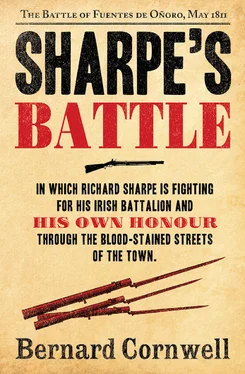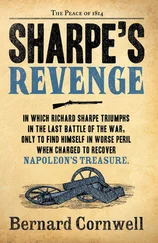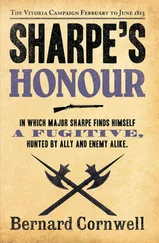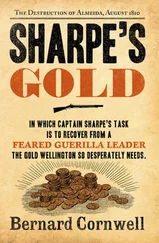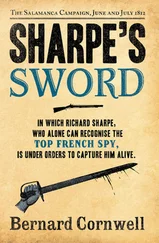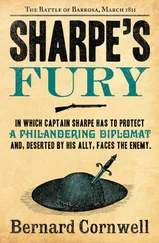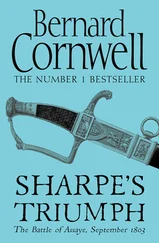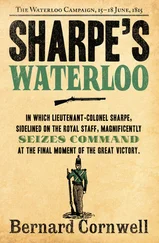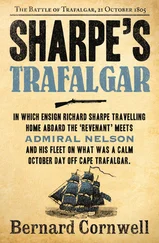‘And my wife, madame,’ Loup said, ‘is buried in her kitchen in Besançon. Alas.’ He held a hand towards the door, offering to escort her down the winding stairs, but Ducos held the Spanish woman back.
‘You’re ready to go?’ Ducos asked Juanita when Loup was gone out of earshot.
‘So soon?’ Juanita answered.
Ducos shrugged. ‘I suspect the Real Compañía Irlandesa will have reached the British lines by now. Certainly by the month’s end.’
Juanita nodded. ‘I’m ready.’ She paused. ‘And the British, Ducos, will surely suspect the Real Compañía Irlandesa’s motives?’
‘Of course they will. They would be fools not to. And I want them to be suspicious. Our task, madame, is to unsettle our enemy, so let them be wary of the Real Compañía Irlandesa and perhaps they will overlook the real threat?’ Ducos took off his spectacles and polished their lenses on the skirts of his plain jacket. ‘And Lord Kiely? You’re sure of his affections?’
‘He is a drunken fool, Major,’ Juanita answered. ‘He will do whatever I tell him.’
‘Don’t make him jealous,’ Ducos warned.
Juanita smiled. ‘You may lecture me on many things, Ducos, but when it comes to men and their moods, believe me, I know all there is to know. Do not worry about my Lord Kiely. He will be kept very sweet and very obedient. Is that all?’
Ducos looped his spectacles back into place. ‘That is all. May I wish you a good night’s rest, madame?’
‘I’m sure it will be a splendid night, Ducos.’ The Doña Juanita smiled and walked from the room. Ducos listened as her spurs jangled down the steps, then heard her laugh as she encountered Loup who had been waiting at the foot of the steps. Ducos closed the door on the sound of their laughter and walked slowly back to the window. In the night the rain beat on, but in Ducos’s busy mind there was nothing but the vision of glory. This did not just depend on Juanita and Loup doing their duty, but rather on the clever scheme of a man whom even Ducos acknowledged as his equal, a man whose passion to defeat the British equalled Ducos’s passion to see France triumphant, and a man who was already behind the British lines where he would sow the mischief that would first rot the British army, then lead it into a trap beside a narrow ravine. Ducos’s thin body seemed to quiver as the vision unfolded in his imagination. He saw an insolent British army eroded from within, then trapped and beaten. He saw France triumphant. He saw a river gorge crammed to its rocky brim with bloody carcasses. He saw his Emperor ruling over all Europe and then, who could tell, over the whole known world. Alexander had done it, why not Bonaparte?
And it would begin, with a little cunning from Ducos and his most secret agent, on the banks of the Coa near the fortress of Almeida.
‘This is a chance, Sharpe, upon my soul it is a chance. A veritable chance. Not many chances come in a man’s life and a man must seize them. My father taught me that. He was a bishop, you see, and a fellow doesn’t rise from being curate to bishop without seizing his chances. You comprehend me?’
‘Yes, sir.’
Colonel Claud Runciman’s massive buttocks were well set on the inn bench while before him, on a plain wooden table, were the remnants of a huge meal. There were chicken bones, the straggling stalks of a bunch of grapes, orange peel, rabbit vertebrae, a piece of unidentifiable gristle and a collapsed wineskin. The copious food had forced Colonel Runciman to unbutton his coat, waistcoat and shirt in order to loosen the strings of his corset and the subsequent distending of his belly had stretched a watch chain hung thick with seals tight across a strip of pale, drum-taut flesh. The Colonel belched prodigiously. ‘There’s a hunchbacked girl somewhere about who serves the food, Sharpe,’ Runciman said. ‘If you see the lass, tell her I’ll take some pie. With some cheese, perhaps. But not if it’s goat’s cheese. Can’t abide goat’s cheese; it gives me spleen, d’you see?’ Runciman’s red coat had the yellow facings and silver lace of the 37th, a good line regiment from Hampshire that had not seen the Colonel’s ample shadow in many a year. Recently Runciman had been the Wagon Master General in charge of the drivers and teams of the Royal Wagon Train and their auxiliary Portuguese muleteers, but now he had been appointed liaison officer to the Real Compañía Irlandesa.
‘It’s an honour, of course,’ he told Sharpe, ‘but neither unexpected nor undeserved. I told Wellington when he made me Wagon Master General that I’d do the job as a favour to him, but that I expected a reward for it. A fellow doesn’t want to spend his life thumping sense into thick-witted wagon drivers, good God, no. There’s the hunchback, Sharpe! There she is! Stop her, Sharpe, there’s a kind fellow! Tell her I want pie and a proper cheese!’
The pie and cheese were arranged and another wine-skin was fetched, along with a bowl of cherries, to satisfy the last possible vestiges of Runciman’s appetite. A group of cavalry officers sitting at a table on the far side of the yard were making wagers on how much food Runciman could consume, but Runciman was oblivious of their mockery. ‘It’s a chance,’ he said again when he was well tucked into his pie. ‘I can’t tell what’s in it for you, of course, because a chap like you probably doesn’t expect too much out of life anyway, but I reckon I’ve got a chance at a Golden Fleece.’ He peered up at Sharpe. ‘You do know what real means, don’t you?’
‘Royal, sir.’
‘So you’re not completely uneducated then, eh? Royal indeed, Sharpe. The royal guard! These Irish fellows are royal! Not a pack of common carriers and mule-drivers. They’ve got royal connections, Sharpe, and that means royal rewards! I’ve half an idea that the Spanish court might even give a pension with the Order of the Golden Fleece. The thing comes with a nice star and a golden collar, but a pension would be very acceptable. A reward for a job well done, don’t you see? And that’s just from the Spanish! The good Lord alone knows what London might cough up. A knighthood? The Prince Regent will want to know we’ve done a good job, Sharpe, he’ll take an interest, don’t you see? He’ll be expecting us to treat these fellows proper, as befits a royal guard. Order of the Bath at the very least, I should think. Maybe even a viscountcy? And why not? There’s only one problem.’ Colonel Runciman belched again, then raised a buttock for a few seconds. ‘My God, but that’s better,’ he said. ‘Let the effusions out, that’s what my doctor says. There’s no future in keeping noxious effusions in the body, he tells me, in case the body rots from within. Now, Sharpe, the fly in our unguent is the fact these royal guards are all Irish. Have you ever commanded the Irish?’
‘A few, sir.’
‘Well, I’ve commanded dozens of the rogues. Ever since they amalgamated the Train with the Irish Corps of Wagoners, and there ain’t much about the Irish that I don’t know. Ever served in Ireland, Sharpe?’
‘No, sir.’
‘I was there once. Garrison duty at Dublin Castle. Six months of misery, Sharpe, without a single properly cooked meal. God knows, Sharpe, I strive to be a good Christian and to love my fellow man, but the Irish do sometimes make it difficult. Not that some of them ain’t the nicest fellows you could ever meet, but they can be obtuse! Dear me, Sharpe, I sometimes wondered if they were gulling me. Pretending not to understand the simplest orders. Do you find that? And there’s something else, Sharpe. We’ll have to be politic, you and I. The Irish’ – and here Runciman leaned awkwardly forward as though confiding something important to Sharpe – ‘are very largely Romish, Sharpe. Papists! We shall have to watch our theological discourse if we’re not to unsettle their tempers! You and I might know that the Pope is the reincarnation of the Scarlet Whore of Babylon, but it won’t help our cause if we say it out loud. Know what I mean?’
Читать дальше
